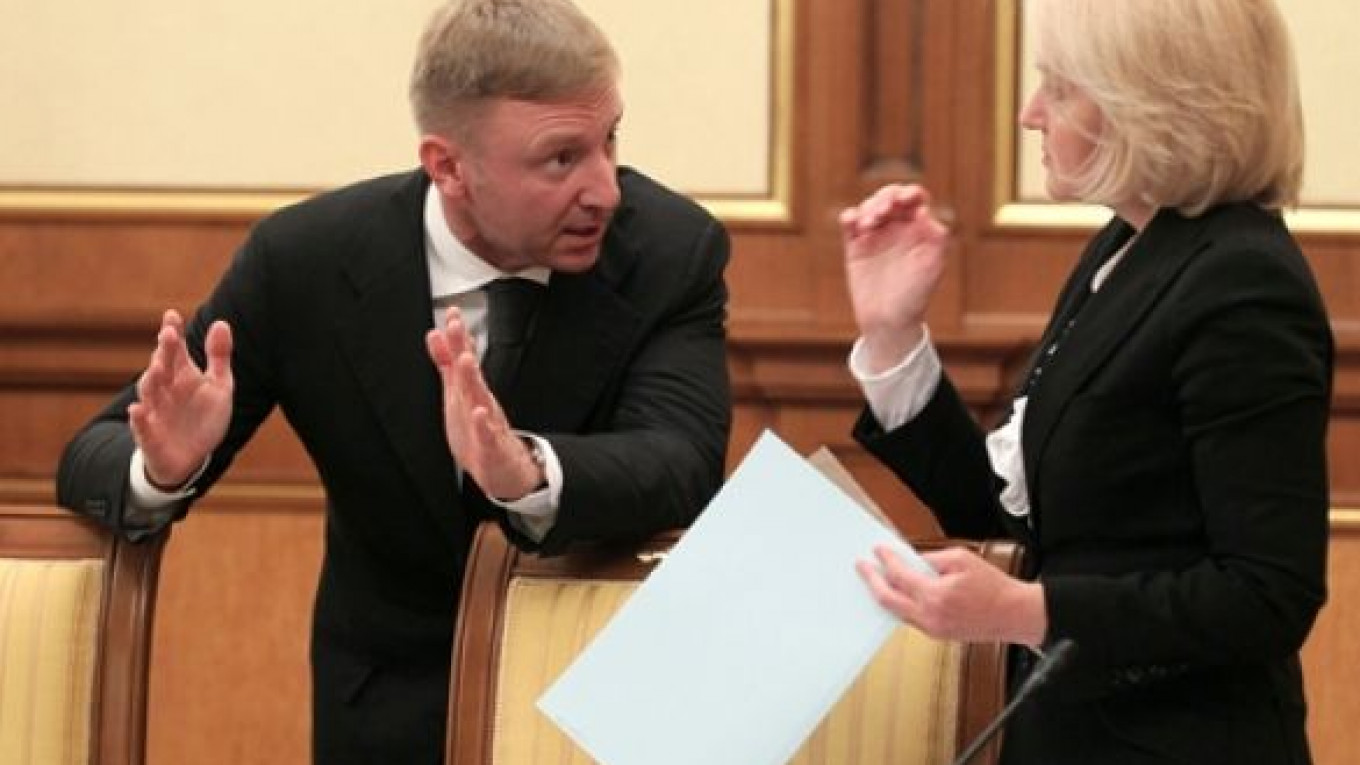Embattled Education and Science Minister Dmitry Livanov said Monday that Russian professors would get a pay rise in September in a move seen as an attempt to appease opposition to his tenure at the ministry.
Livanov has been heavily criticized for implementing a series of unpopular reforms since being appointed last May. President Vladimir Putin has resisted calls to fire the minister, however, saying that Livanov should be given time to settle in.
"Very serious changes await us on Sept. 1. There will be a radical increase in the base salary of teachers," Livanov told the heads of leading Russian universities, referring to the date on which a controversial new education law will come into force.
"Bonuses for those with academic degrees should rise significantly. It's shameful to pay a professor between 12,000 and 15,000 rubles ($370 and $460) a month," he said, adding in comments carried by RIA Novosti that institutions of higher learning that did not raise teachers' pay would receive reduced state subsidies.
Calling it “shameful” to pay university teachers as little as $370 a month, the education minister vows an increase starting Sept. 1.
Talk of boosting professors' pay, which is miserly compared to that in many Western nations, came the same day that Livanov's ministry for the first time published on its website the income declarations of heads of the country's leading educational institutions.
Most university rectors declared earnings between 2 and 4 million rubles last year, far above that of their subordinates, and the pay of some university heads stretched into the tens of millions.
The highest earner, Anatoly Ovodenko, rector of St. Petersburg's Aerospace Engineering University, pocketed more than 71 million rubles. Ovodenko and his wife also own four apartments, two houses and a Porsche Cayenne jeep, according to his declaration.
University professors interviewed by The Moscow Times were divided on how to interpret Livanov's comments on pay raises for their ranks, with one expressing skepticism that the ministry would boost her paycheck and another taking the minister at his word.
"I don't believe that salaries will rise. The ministry has been telling us that they'll have to cut funding, so I don't know how they'll do it," said Yelena Klimova, a psychology professor at Kaluga State University.
"We're in the middle of a demographic crisis, and student numbers are dipping. The only explanation I can give is that they'll raise our salaries but increase our workload," said Klimova, who said she takes home just over 15,000 rubles a month.
But Ivan Zasursky, a journalism professor at Moscow State University, said he believed the government was committed to increasing professors' paychecks.
"Raising teachers' pay makes economic sense — increasing professors' salaries will stimulate spending. The current Cabinet's social policies are smart," said Zasursky, who said he earned close to 25,000 rubles a month.
The issue of instructors' low salaries has been on the government's radar for years, and Putin promised to boost their wages before returning for a third term as president last year.
Revelations that rectors, meanwhile, are earning comparatively huge sums are unlikely to go down well with regular teaching staff. Klimova, from Kaluga State University, said she was "absolutely horrified" at the discrepancy between rectors' and professors' earnings.
"In our universities, the rectors are gods incarnate. Teachers don't have any way of knowing what they're up to," she said.
Zasursky, from Moscow State University, praised Livanov for introducing mandatory declarations to promote transparency and said ministry officials should check up on rectors who regularly declare substantial income.
"In Russia, we're only just beginning to learn who owns what. If Livanov is bold enough, he could get the upper hand and be seen as a hero," Zasursky said, blaming politicians implicated in an anti-plagiarism drive for the strident criticism that Livanov has faced.
In April, a lawmaker with the nationalist Liberal Democratic Party asked Prime Minister Dmitry Medvedev in the State Duma whether "the time had come" for Livanov to resign, but Medvedev defended the education minister. Other critics blame Livanov for overseeing the passage of legislation that they say threatens Russians' constitutional right to free education.
"Livanov has been pushed into a corner, but he's intent on cleaning up the mess in the education system," Zasursky said. "The campaign against him is only making him more daring."
Contact the author at a.winning@imedia.ru
Related articles:
A Message from The Moscow Times:
Dear readers,
We are facing unprecedented challenges. Russia's Prosecutor General's Office has designated The Moscow Times as an "undesirable" organization, criminalizing our work and putting our staff at risk of prosecution. This follows our earlier unjust labeling as a "foreign agent."
These actions are direct attempts to silence independent journalism in Russia. The authorities claim our work "discredits the decisions of the Russian leadership." We see things differently: we strive to provide accurate, unbiased reporting on Russia.
We, the journalists of The Moscow Times, refuse to be silenced. But to continue our work, we need your help.
Your support, no matter how small, makes a world of difference. If you can, please support us monthly starting from just $2. It's quick to set up, and every contribution makes a significant impact.
By supporting The Moscow Times, you're defending open, independent journalism in the face of repression. Thank you for standing with us.
Remind me later.






